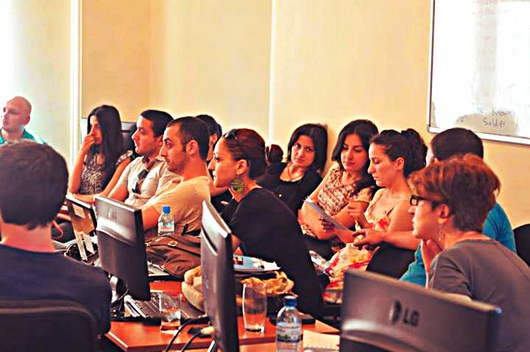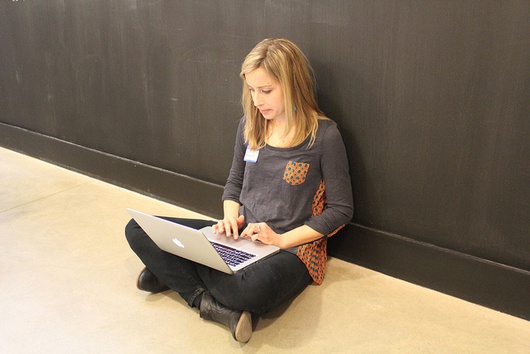
Hackathons and digital feminism in Tbilisi, Georgia
Published on
This week Tbilisi hosted Europe's biggest college hackathon. Digital technology is taking off in Georgia, but it's leaving women behind. With traditional gender roles still largely ingrained, Georgian women are underrepresented in the workforce. But change is on the horizon. A bright future beckons for Georgian women and technology.
This week, an event claiming to be the biggest college Hackathon in all of Europe took place in a most unexpected location, Tbilisi, Georgia. Organized by a non-profit organization called Uni Hack, and sponsored by a variety of Georgian banks and software companies, the event brought together over 500 students from a variety of Georgian Universities, future programmers, developers, designers, and engineers. Several IT students from Georgia (the country), who were ironically attending Georgia Tech University in the US state of Georgia, decided to launch Uni Hack in December 2013 a replication of the hackathons they had attended in the United States.
 The event was a huge success. The Tbilisi-based Caucasus School of Technology provided the space and the students took care of the rest. Now, barely three months later, the second edition of the hackathon counts on the support of eight important sponsors and offers up to 10,000 GEL (4,000 Euros) in prizes; not a small sum for the cash strapped Caucasian country. But despite the obvious benefits that the creativity and innovation of a hackathon brings to the country, the event also helps to showcase an alarming trend: the majority of the hackathon participants were male. Only one of the fifty teams participating consisted entirely of women, and none of the ten speakers were female.
The event was a huge success. The Tbilisi-based Caucasus School of Technology provided the space and the students took care of the rest. Now, barely three months later, the second edition of the hackathon counts on the support of eight important sponsors and offers up to 10,000 GEL (4,000 Euros) in prizes; not a small sum for the cash strapped Caucasian country. But despite the obvious benefits that the creativity and innovation of a hackathon brings to the country, the event also helps to showcase an alarming trend: the majority of the hackathon participants were male. Only one of the fifty teams participating consisted entirely of women, and none of the ten speakers were female.
Around the world, women are grossly underrepresented in technological fields, and highly developed countries are no exception. While women hold 57% of jobs across the United States, only 25% of positions in computing occupations are held by women. Logically, the same trend can be found in institutes of higher education, where women receive only 14% of computer science degrees at major research universities. Incredibly, however, this number has fallen in recent years. In 1985, 37% of undergraduate degree recipients in computer science were women. By 2010, that percentage had fallen to 18%. In the United Kingdom, the situation is even worse. While women make up 49% of the labour market, they comprise only 17% of IT and telecom professionals.
 In Georgia, the difficulties faced by women who want to enter the tech industry are even direr. The country is plagued by poverty and only 30% of women claim to be employed, as traditional gender roles maintain that a woman’s responsibility is first and foremost to her children and family. But JumpStart-Georgia, a non-profit organization that uses technology to communicate complex information in a way that is engaging and easy to understand, is breaking these trends as the first tech NGO in the country to employ over 50% women.
In Georgia, the difficulties faced by women who want to enter the tech industry are even direr. The country is plagued by poverty and only 30% of women claim to be employed, as traditional gender roles maintain that a woman’s responsibility is first and foremost to her children and family. But JumpStart-Georgia, a non-profit organization that uses technology to communicate complex information in a way that is engaging and easy to understand, is breaking these trends as the first tech NGO in the country to employ over 50% women.
Combining the skills of programmers, front-end designers, and data journalists, JumpStart created the website feradi.info where a variety of infographics and interactive online tools visualize large data sets that are useful to citizens but are usually too complex or disorganized for the general public to consume. When the organization launched in 2009, like most tech-based organizations, the majority of its employees were male. But over time several female designers, data journalists, administrative assistants, and project managers joined the team, and eventually the gender balance tipped in their favour.
Now, several of the organization’s members have agreed to volunteer their Sunday afternoons to share their passion for technology with more Georgian women. Launching a Tbilisi-based version of Girls Who Code -a New York-based non-profit organization that teaches computer programing to young girls in order to address the gender disparities existent in technological fields – JumpStart’s staff now works directly with a group of around ten female professionals between the ages of 22-35 to address these issues in Georgia. The women, most of whom are journalists, researchers, and activists, bring their own laptops to JumpStart’s office each week to learn to code with Ruby.
to volunteer their Sunday afternoons to share their passion for technology with more Georgian women. Launching a Tbilisi-based version of Girls Who Code -a New York-based non-profit organization that teaches computer programing to young girls in order to address the gender disparities existent in technological fields – JumpStart’s staff now works directly with a group of around ten female professionals between the ages of 22-35 to address these issues in Georgia. The women, most of whom are journalists, researchers, and activists, bring their own laptops to JumpStart’s office each week to learn to code with Ruby.
A hackathon at New York Code for Good Challenge
"As many people do, I thought coding was the domain of math and science geeks and beyond the comprehension of mere social scientists like me. But then I joined JumpStart’s Girls that Code initiative and realized that there is no magic involved! There is, however, a lot to learn about how to structure your path from a problem to a solution through a language that only computers "speak". And that knowledge comes in handy in virtually every field you could possibly think of. In my case, these skills will allow me to help keep the government transparent, open, and accountable,” says Tamara Sartania, a young professional working for the National Democratic Institute in Georgia and a Girls Who Code enthusiast.
Tamara and JumpStart appear to have touched on a reality lost to many. Computer programming goes far beyond the domain of building websites or getting a good job in a company like Google. It is also a vital skill for idealists in countries where open data is still scarce and where information is essential if one is to understand society and work to improve it.



